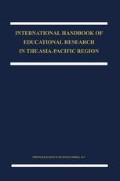Abstract
Science is commonly viewed as fundamental to the education of all students, with ‘scientific literacy’, being seen as a key curriculum goal. During their school science learning, students are generally expected to come to an understanding of three interrelated aspects of science: science content knowledge, practical work, and nature of science or science and society areas respectively. Students are also typically expected to develop positive attitudes towards science and technology as a result of their school learning experiences.
Access this chapter
Tax calculation will be finalised at checkout
Purchases are for personal use only
Preview
Unable to display preview. Download preview PDF.
References
Aikenhead, G. (2001). Renegotiating the culture of school science. In R. Millar, J. Leach & J. Osborne (Eds.), Improving Science Education — The Contribution of Research (pp. 245 - 264 ). Buckingham: Open University Press.
Cheung, D., & Ng, P. (2000). Science teachers’ beliefs about curriculum design. Research in Science Education, 30 (4), 357 - 375.
Cogan, L., Wang, H., & Schmidt, W. H. (2001). Culturally specific patterns in the conceptualisation of the school science curriculum: Insights from TIMSS. Studies in Science Education, 36, 105 - 134.
Fensham, P. (1999). Science content as problematic: Issues for research. In H. Behrendt & H. Dahnke (Eds.), Research in Science Education — Past, Present and Future. Dordrecht: Kluwer.
Goodrum, D., Hackling, M., & Rennie, L. (2000). The Status and Quality of Teaching and Learning of Science in Australian Schools. Research Report prepared for the Department of Education, Training and Youth Affairs: Canberra.
Hipkins, R., Bolstad, R., Baker, R., Jones, A., Barker, M., Bell, B., Coll, R., Cooper, B., Forret, M., France, B., Haigh, M., Harlow, A., & Taylor, I. (2002). Curriculum learning and effective pedagogy: A literature review in science education. Wellington: Ministry of Education.
Jenkins, E. (2001). Research in science education in Europe: Retrospect and prospect. In H. Behrendt & H. Danke (Eds.), Research in Science Education — Past, Present, and Future (pp. 17 - 26 ). Dordrecht: Kluwer.
Linkson, M. (1999). Some issues in providing culturally appropriate science curriculum support for indigenous students. Australian Science Teachers’ Journal, 45(1), 41 - 48.
Loo, S. (2001). Islam, science and science education: Conflict or concord. Studies in Science Education, 36, 45 - 77.
Martin, M., Mullis, I., Gonzalez, E., Gregory, K., Smith, T., Chrostowski, S., Garden, R., & O’Connor, K. (2000). TIMSS 1999 International Science Report: Findings from IEA’s Repeat of the Third International Mathematics and Science Study at the Eight Grade. Chestnut Hill MA: International Study Centre, Boston College.
Mayer, V., & Kumano, Y. (1999). The role of system science in future school science curricula. Studies in Science Education, 34, 71 - 91.
McKinley, E., McPherson Waiti, P., & Bell, B. (1992). Language, culture and science education. International Journal of Science Education, 14(5), 579 - 595.
Michie, M., & Linkson, M. (1999) Interfacing Western science and indigenous knowledge: A Northern Territory perspective. 30th Australasian Science Education Research Association Conference. Rotorua, July.
Millar, R., & Osborne, J. F. (Eds.) (1998). Beyond 2000: Science Education for the Future. London: Kings College.
Ogawa, M. (2001). Reform Japanese style: Voyage into an unknown and chaotic future. Science Education, 85(5), 586 - 606.
Pfundt, H., & Duit, R. (2000). Bibliography: Students’ Alternative Frameworks and Science Education ( 5th ed. ). Kiel: Institute for Science Education at the University of Kiel.
Ratcliffe, M., Osborne, J., Collins, S., Millar, R., & Duschl, R. (2001) Evidence-based practice in Science Education (EPSE). Teaching pupils ’ideas-about-science’: Clarifying learning goals and improving pupil performance. Third Conference of the European Science Education Research Association (ESERA). Thessaloniki, Greece, 21-25 August 2001.
Rennie, L. (2000). Gender and science, technology and vocational education in Asia and the Pacific. In E. Jenkins (Ed.), Innovations in Science and Technology Education (pp. 99 - 142 ). Paris: Falmer UNESCO.
Tasker, R., & Freyberg, P. (1985). Facing mismatches in the classroom. In R. Osborne & P. Freyberg (Eds.), Learning in Science: The Implications of Children’s science. Auckland: Heinemann.
Toh, K., Boo, H., & Yeo, H. (1997). Open-ended investigation: Performance and effects of pretraining. Research in Science Education, 27(1), 131 - 140.
Tsai, C. (1999). Laboratory exercises help me memorise scientific truths: A study of eight graders’ scientific epistemological views and learning of laboratory activities. Science Education, 83 (6), 654 - 674.
Tsai, C. (2000). Ideas about earthquakes after experiencing a natural disaster in Taiwan: An analysis of students’ worldviews. International. Journal of Science Education, 23(10), 1007 - 1016.
Venville, G., Wallace, J., Rennie, L., & Malone, J. (2002). Curriculum integration: Eroding the high ground of science as a school subject. Studies in Science Education, 37, 43 - 84.
Wallace, J., C Chou, C. (2001). Similarity and difference: Student cooperation in Taiwanese and Australian science classrooms. Science Education, 85, 694 - 711.
Wang, W., Wang, J., Zhang, G., Lang, Y., & Mayer, V. (1996). Science education in the People’s Republic of China. Science Education, 80(2), 203 - 222.
White, G., Russell, T., & Gunstone, R. (2002). Curriculum change. In J. Wallace & W. Louden (Eds.), Dilemmas of Science Teaching: Perspectives on Problems of Practice (pp. 231 - 244 ). London: Routledge Falmer.
White, R. (1992). Implications of recent research on learning for curriculum and assessment. Journal of Curriculum Studies, 24(2), 153 - 164.
White, R., & Mitchell, I. (1994). Metacognition and the quality of learning. Studies in Science Education, 23, 21 - 37.
Author information
Authors and Affiliations
Editor information
Editors and Affiliations
Rights and permissions
Copyright information
© 2003 Springer Science+Business Media Dordrecht
About this chapter
Cite this chapter
Baker, R., Hipkins, R. (2003). Science Curricula. In: Keeves, J.P., et al. International Handbook of Educational Research in the Asia-Pacific Region. Springer International Handbooks of Education, vol 11. Springer, Dordrecht. https://doi.org/10.1007/978-94-017-3368-7_42
Download citation
DOI: https://doi.org/10.1007/978-94-017-3368-7_42
Publisher Name: Springer, Dordrecht
Print ISBN: 978-90-481-6167-6
Online ISBN: 978-94-017-3368-7
eBook Packages: Springer Book Archive

